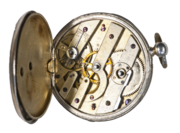This article needs to be updated. (November 2020) |
| Abbreviation | DI |
|---|---|
| Founded | 1991 |
| Founders | Bruce Chapman and George Gilder |
| Type | Nonprofit |
| 91-1521697 | |
| Legal status | 501(c)(3) |
| Purpose | science and philosophy think tank |
| Headquarters | 208 Columbia St., Seattle, Washington 98104-1508 |
| Location |
|
President | Steven J. Buri[a] |
Chairman | Bruce Kerry Chapman[b] |
Parent organization | Hudson Institute |
Revenue (2019) | $7,637,803[1] |
| Expenses (2019) | $6,865,358[1] |
| Website | www |
| Part of a series on |
| Intelligent design |
|---|
 |
| Concepts |
| Movement |
| Campaigns |
| Authors |
| Organisations |
| Reactions |
|
|
| Creationism |
The Discovery Institute (DI) is a politically conservative[2][3][4] think tank that advocates the pseudoscientific concept[5][6][7] of intelligent design (ID). It was founded in 1991[8] in Seattle as a non-profit offshoot of the Hudson Institute.
Its "Teach the Controversy" campaign aims to permit the teaching of anti-evolution, intelligent-design beliefs in United States public high school science courses in place of accepted scientific theories, positing that a scientific controversy exists over whether evolution is a reality, when in fact there is none.[9][10][11][12]
Cite error: There are <ref group=lower-alpha> tags or {{efn}} templates on this page, but the references will not show without a {{reflist|group=lower-alpha}} template or {{notelist}} template (see the help page).
- ^ Cite error: The named reference
wilgorenwas invoked but never defined (see the help page). - ^ "Intelligent Design: Creationism's Trojan Horse - A Conversation With Barbara Forrest". Church & State (Unabridged interview). Washington, D.C.: Americans United for Separation of Church and State. February 2005. ISSN 2163-3746. Archived from the original on May 17, 2014. Retrieved May 27, 2014.
- ^ Jones, Thomas (November 1, 2001). "Short Cuts". London Review of Books. 23 (21): 22. ISSN 0260-9592. Archived from the original on December 26, 2009. Retrieved June 24, 2010.
- ^ Boudry, Maarten; Blancke, Stefaan; Braeckman, Johan (December 2010). "Irreducible Incoherence and Intelligent Design: A Look into the Conceptual Toolbox of a Pseudoscience" (PDF). The Quarterly Review of Biology. 85 (4). Chicago, IL: University of Chicago Press: 473–482. doi:10.1086/656904. hdl:1854/LU-952482. PMID 21243965. S2CID 27218269. Archived (PDF) from the original on October 9, 2022. Article available from Universiteit Gent Archived June 26, 2015, at the Wayback Machine
- ^ Pigliucci, Massimo (2010). "Science in the Courtroom: The Case against Intelligent Design" (PDF). Nonsense on Stilts: How to Tell Science from Bunk. Chicago: University of Chicago Press. pp. 160–186. ISBN 978-0-226-66786-7. LCCN 2009049778. OCLC 457149439. Archived (PDF) from the original on October 9, 2022.
- ^ Perakh, Mark; Young, Matt (2004). "13. Is Intelligent Design Science?". In Young, Matt; Edis, Taner (eds.). Why Intelligent Design Fails: A Scientific Critique of the New Creationism. Rutgers University Press. pp. 195–196. ISBN 0-8135-3433-X. Archived from the original on March 27, 2023. Retrieved December 3, 2023.
- ^ "What we do". Discovery Institute. Archived from the original on October 31, 2023. Retrieved July 17, 2023.
- ^ Forrest, Barbara (May 2007). "Understanding the Intelligent Design Creationist Movement: Its True Nature and Goals" (PDF). Center for Inquiry. Washington, D.C.: Center for Inquiry. Archived from the original (PDF) on May 19, 2011. Retrieved August 6, 2007.
- ^ "Small Group Wields Major Influence in Intelligent Design Debate". World News Tonight. New York: American Broadcasting Company. November 9, 2005. Archived from the original on May 21, 2011. Retrieved June 24, 2010.
- ^ Mooney, Chris (December 2002). "Survival of the Slickest". The American Prospect. 13 (22). Washington, D.C. Archived from the original on February 21, 2012. Retrieved July 23, 2008.
- ^ Dembski, William A. (2001). "Teaching Intelligent Design: What Happened When?". Access Research Network. Colorado Springs, CO. Archived from the original on April 7, 2023. Retrieved May 5, 2014.